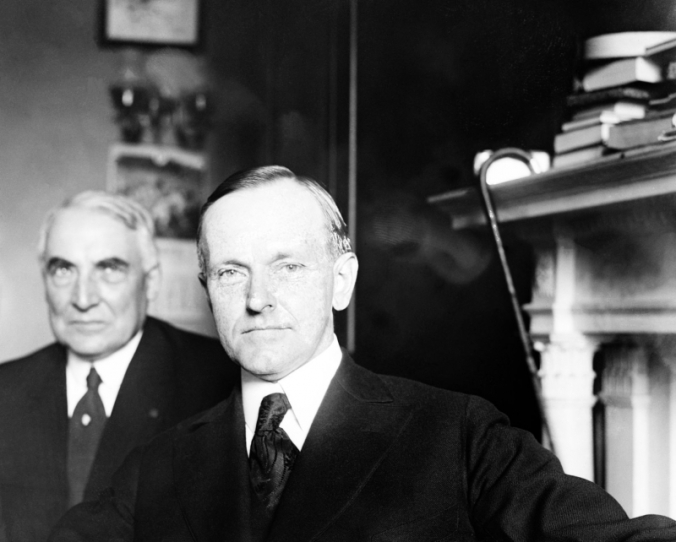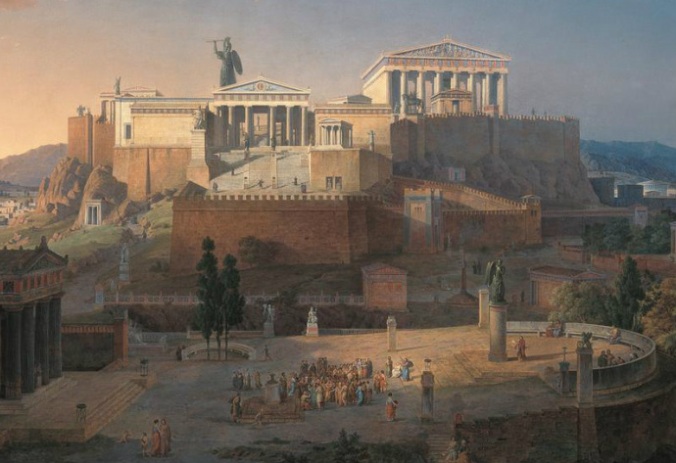
Men are always influenced by their environment. The life and history of each individual is what it is, in part, because of the surroundings into which he was born and lived. There is the corollary to this. The history of localities is what it is because of the character of the people who have lived there. The little promontory of Greece has a meaning for us, a place in history, that is born of the spirit of the people who dwelt there more than two thousand years ago. Caesar could not have been Caesar had his earthly lot been cast in the City of Pekin. Our own Lincoln, great as he was, would have been something far different had he been living in Paris in the days of the French Revolution. This locality has cast its influence over the people who have lived here and they in turn have wrought their character into its history.
This valley [along the Ohio River], now the scene of so much industrial activity, so typically American, was beyond the frontier in the days of the Revolution. It was only after the peace had been declared, only after the Congress had by Ordinance provided for its well-being that settlers came here in profusion. They are of the stock that fought the Revolution. I believe it can safely be asserted that no body of men of equal numbers ever wrought so wisely or so effectively upon the history of mankind as the Revolutionary patriots of America and their descendants. They bequeathed a continent to freedom, showered a nation with untold riches and finally saved civilization. Such was the blood that settled here, American through and through. Wherever they go the world knows the influence they wield, what they have done, are doing, and will do. No people ever exhibited a like enterprise for business, or a like genius for government. Along this valley those powers have found full expression…
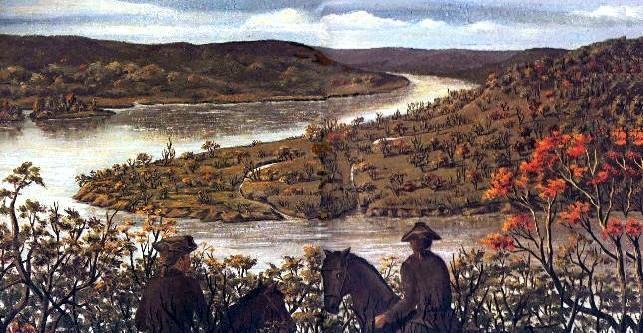
From this blood, from these surroundings, came that great American to whom this stately memorial was reared. There is that in the present condition of our country which admonishes us to remember William McKinley. He was wiser than his critics. He was gentler than his friends. He was firmer than his party. He found the nation depressed, and distraught, he brought it prosperity and contentment. He led the people not from afar off, where his influence could not be felt, but from near at hand, directing their course, but yet with them. It is little wonder that men loved him…He was American. He believed in America. He advocated first and last American policies. He established a thoroughly American system. Yet he was something more. He was the first to recognize that the Spanish War had made us a world power with world responsibilities. He was not a man to shirk responsibilities. He did not believe that his country, which he had seen rise to the sacrifice involved in the solution of a world problem, would shirk its responsibilities. He knew that this country which he had seen on so many occasions true to itself would not be false to any other people…
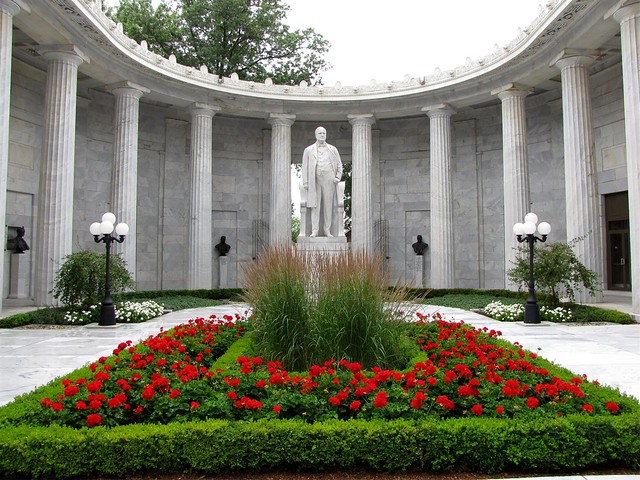
William McKinley Memorial in Niles, Ohio
Nations do not stand still. They advance or they recede. America goes forward. It would have been in vain that this monument were built to a great son of Ohio, who had grown to hold in his vision a strong and righteous nation, desiring the welfare of humanity, if he were to have no like successor, no representative of kindred mind to take up and carry on the ever unfinished task of serving the world most by serving America best. Your hope is being realized, your faith is being justified. In the light of experience you build, and go on building, not merely for the past, but for the future, confident that as the succession has not failed it will not fail. As there have come those who have been raised up to serve the nation in time of need, so they come now, so they will come. In those who have in the past been honored here, in him who today is honored, this promise stands fulfilled. And what a grand fulfillment in William McKinley and Warren G. Harding…
It were enough to say of any man that his countrymen had chosen him the President of the United States of America. But to be chosen to that office by a majority of seven one half million votes is a distinction that never came to any other President. Of itself it has a deep significance. It means that President Harding represents the common aspirations, the general ideals, of his countrymen. There is that in him which responds to the universal impulse of humanity, which recognizes but one rank — the common brotherhood of all mankind. To have that is to be a great American. The world holds no greater praise.
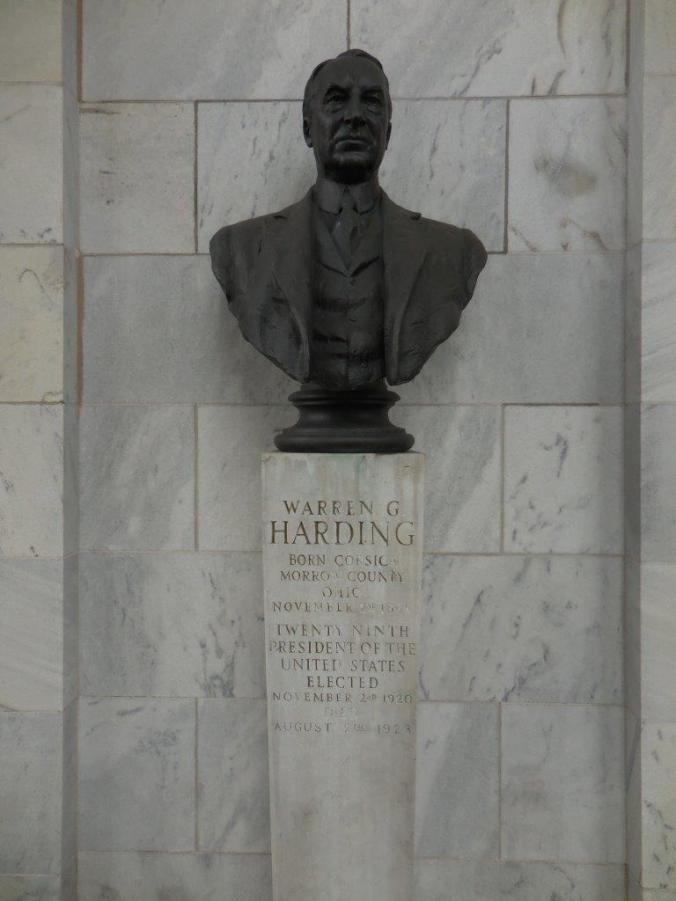
President Warren Harding’s bust within the McKinley Memorial at Niles. Photo credit: PresidentsUSA.net.
It is this broad sympathy which is responsible for the most outstanding fact of the present administration, the marvelous personal affection in which the President is held by all those who come in contact with him, most especially marked in those, who, for a better term, we call the common people. This affection has grown from the day he was nominated until it has become a fashion among all classes. The people have seen him cheering with them at the ball park and the polo field, they have seen him enraptured in the presence of five thousand flag draped caskets bearing the remains of our soldiers who died overseas, and in mutual understanding of each other have found mutual love and affection. The open White House gates are but the symbol of the open heart of him who wishes his every approach open to the people.
This disposition has been manifest in the coordinating harmony of all government activities. In fact the American government is now in contact with itself, in contact with our own people, and in contact with other nations. There is a harmony in the Cabinet and in the Congress, bred not of coercion but of cooperation. There has been established at Washington a government of the people…
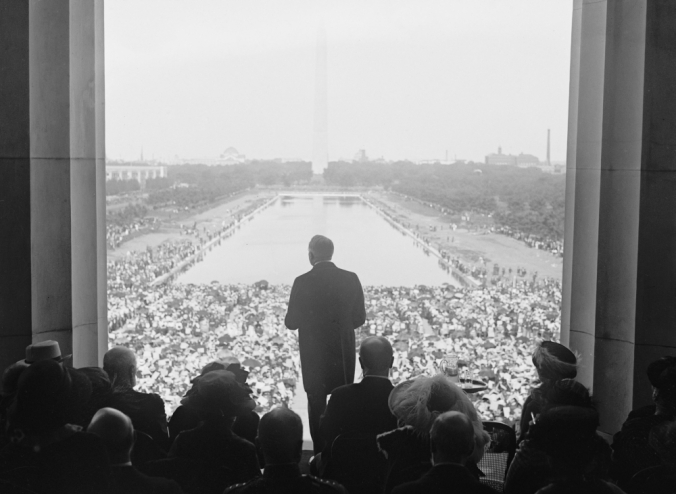
President Harding speaking at the Lincoln Memorial dedication, 1921.
In a series of statesmanlike addresses, to the Congress and the people, the President has laid out a wise course in relation to both foreign and domestic policy. That course is being followed to the great benefit of the nation at home and abroad. It is bringing about readjustment and realignment to a stabilized basis in our internal affairs and a restoration to respect and leadership in the world. The great obligations of government have been courageously taken up and will go firmly forward. There will be no recession.
There are in this country, as in every other, two contending forces which, reduced to their lowest terms, represent reaction on one hand and revolution on the other. It is not unfair to characterize both as radical. President Harding leans neither to the reactionary line, nor to the revolutionary line, he holds to the rational line. If there shall be those who expect to see in him the development of a reactionary tendency they will meet disappointment. He will not only support the achievements of all truly humanitarian progress, but he will go forward on the firm foundation of realities. Whatever sacrifices may be necessary to maintain his ideals, that sacrifice he will continue to make.
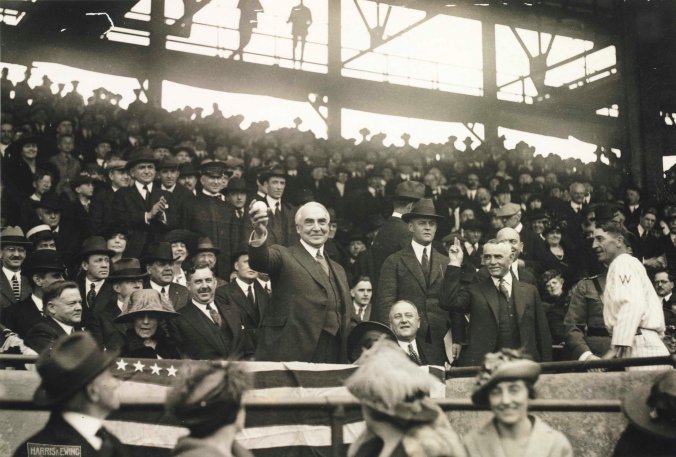
To such a leader, granted again by Providence, giving such wise counsel, inspiring such great confidence, accomplishing such results, holding the promise of such future benefits, we dedicate this day a memorial made in his likeness. But in what spirit do we dedicate it? How can we worthily consecrate it? How can we approach to that high standard here so nobly represented? There is but one method, already indicated, the price of continuing sacrifice.
As these men whom we here honor have made their sacrifices for the public welfare so we, the people of the nation, must make ours. The great burden of the hour is not the needs of the people. They are not measurably greater than before the war. The burden of the hour is the needs of the government. It is that need which must be met by the people. It is not by adding to the requirements of government, but by taking from them, that the burdens of the people can be lightened. There are readjustments to be made. There is reconstruction to be done. There is restoration to be effected. From these the nation cannot escape. Each must bear his part. The appeal to duty never went unheeded by America. In this dedication, in this consecration, let us pledge ourselves, in private industry and public calling, to take up and discharge in the spirit of such great examples, every burden of civilization, every duty of Americans.
The nation needs patience, pacification, and harmony, the world needs patience, pacification and harmony, under righteousness. Let us hallow the memory of him who so greatly desired these in the past by supporting the leadership of him who is so effectively establishing them in the present.
— Calvin Coolidge, excerpts of the dedication of a bust of President Harding at the William McKinley Memorial in Niles, Ohio, June 18, 1921
